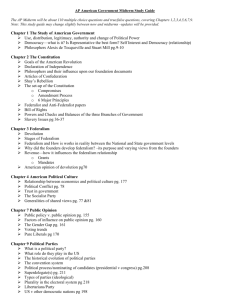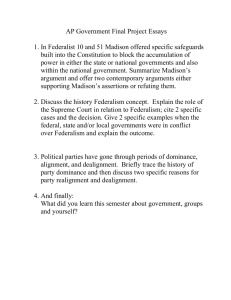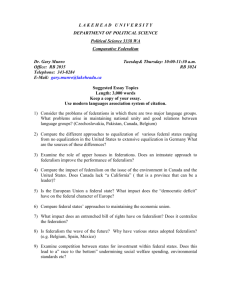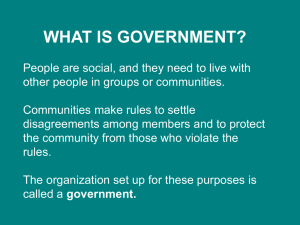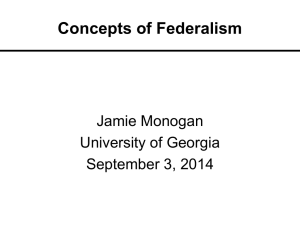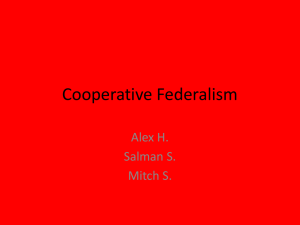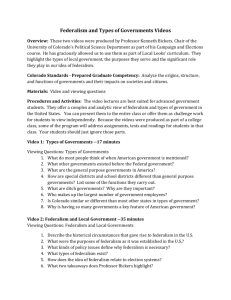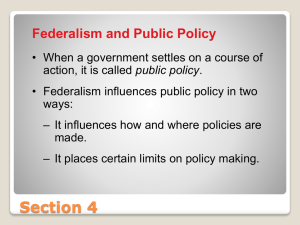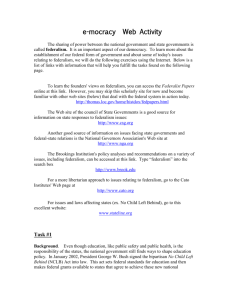The Federalis(M) Society
advertisement
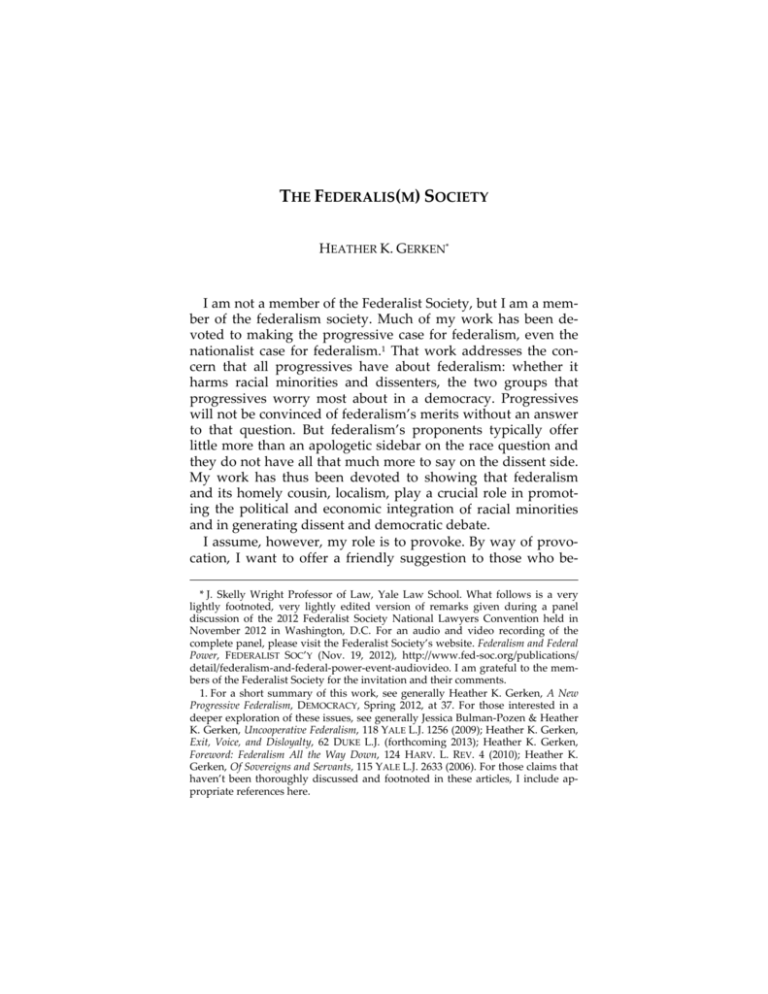
THE FEDERALIS(M) SOCIETY HEATHER K. GERKEN* I am not a member of the Federalist Society, but I am a mem‐ ber of the federalism society. Much of my work has been de‐ voted to making the progressive case for federalism, even the nationalist case for federalism.1 That work addresses the con‐ cern that all progressives have about federalism: whether it harms racial minorities and dissenters, the two groups that progressives worry most about in a democracy. Progressives will not be convinced of federalism’s merits without an answer to that question. But federalism’s proponents typically offer little more than an apologetic sidebar on the race question and they do not have all that much more to say on the dissent side. My work has thus been devoted to showing that federalism and its homely cousin, localism, play a crucial role in promot‐ ing the political and economic integration of racial minorities and in generating dissent and democratic debate. I assume, however, my role is to provoke. By way of provo‐ cation, I want to offer a friendly suggestion to those who be‐ * J. Skelly Wright Professor of Law, Yale Law School. What follows is a very lightly footnoted, very lightly edited version of remarks given during a panel discussion of the 2012 Federalist Society National Lawyers Convention held in November 2012 in Washington, D.C. For an audio and video recording of the complete panel, please visit the Federalist Society’s website. Federalism and Federal Power, FEDERALIST SOC’Y (Nov. 19, 2012), http://www.fed‐soc.org/publications/ detail/federalism‐and‐federal‐power‐event‐audiovideo. I am grateful to the mem‐ bers of the Federalist Society for the invitation and their comments. 1. For a short summary of this work, see generally Heather K. Gerken, A New Progressive Federalism, DEMOCRACY, Spring 2012, at 37. For those interested in a deeper exploration of these issues, see generally Jessica Bulman‐Pozen & Heather K. Gerken, Uncooperative Federalism, 118 YALE L.J. 1256 (2009); Heather K. Gerken, Exit, Voice, and Disloyalty, 62 DUKE L.J. (forthcoming 2013); Heather K. Gerken, Foreword: Federalism All the Way Down, 124 HARV. L. REV. 4 (2010); Heather K. Gerken, Of Sovereigns and Servants, 115 YALE L.J. 2633 (2006). For those claims that haven’t been thoroughly discussed and footnoted in these articles, I include ap‐ propriate references here. 942 Harvard Journal of Law & Public Policy [Vol. 36 lieve, as I do, in federalism and the important role that states play in our democracy. My suggestion is directly related to the subject of our panel: the Supreme Court’s recent Affordable Care Act decision2 and the brouhahas surrounding it. To put the point sharply, the Federalist Society may be the tribe of lawyers that cares the most about state power, but its members are thinking about it in the wrong way. At the very least, they are missing something crucial. That is because most of the Society’s members are ignoring what may be the most important source of state power in the twenty‐first century, one that will only become more salient as time goes on. Most lawyers who care about state power are deeply inter‐ ested in the battle between the sovereigntists and the process federalists. Although that battle is far from over, it is coming perilously close to degenerating into the intellectual equivalent of the “great taste, less filling” debate. Those on both sides of the divide have spent a great deal of time worrying about whether it is state sovereignty or state autonomy that matters, whether we need de jure judicial protections for state power or whether de facto political protections are enough. Those argu‐ ments then get wound around whatever federalism case the Supreme Court has most recently decided, which is precisely what has occurred with National Federation of Independent Busi‐ ness v. Sebelius. But this preoccupation with the sovereignty‐ process debate has led those interested in federalism to miss a simple fact: Much of the state‐federal power game has shifted to precisely where the Affordable Care Act takes us today, the realm of cooperative federalism. Cooperative federalism is where the action is. It is where the future is. And if you care about state power, it might be useful to devote some of the massive intellectual energy now spent on the well‐worn sovereignty‐process debate to thinking about how to ensure that states retain an important role in state‐ federal governance going forward. The part of National Federation of Independent Business that mat‐ ters in the long term is not the part that has dominated the debate thus far: the Commerce Clause ruling.3 What will matter in the 2. Nat’l Fed’n of Indep. Bus. v. Sebelius, 132 S. Ct. 2566 (2012). 3. See id. at 2586–87 (opinion of Roberts, C.J.); see also id. at 2648 (Scalia, Kenne‐ dy, Thomas & Alito, JJ., dissenting). No. 3] The Federalis(m) Society 943 long term is the Spending Clause ruling.4 That is the part of the opinion that goes to the heart of how the States and the federal government will interact going forward. And although national‐ ists call these interactions “cooperative federalism,” I suggest that those who care about state power think about these institutional arrangements as opportunities for “uncooperative federalism”.5 Those interested in state power may bristle at the notion that cooperative federalism—or even uncooperative federalism— offers meaningful opportunities for states to exercise power. That’s because the power states wield in these regimes is the power of the servant, not the sovereign. I certainly understand all of the attractions of the sovereignty model. But as a descrip‐ tive matter, sovereignty is rarely, if ever, to be had in our in‐ creasingly integrated nationalized system.6 We can try to set some limits on the Commerce Clause or forbid commandeer‐ ing, but the federal government has too many paths for achiev‐ ing its ends. If the federal government wants to invade a regu‐ latory sphere, it will find a way to do it. The “Rehnquist Revolution” was an effort to hold back the tide, and recent events have reminded us just how hard the tide is to hold back. And yet States are still powerful. They are still powerful because they play crucial roles inside the federal system, rather than outside of it. States still matter. They matter quite a lot for environmental policy, for healthcare, for welfare, 4. See id. at 2607 (opinion of Roberts, C.J.); id. at 2666–67 (Scalia, Kennedy, Thomas & Alito, JJ., dissenting). 5. See Bulman‐Pozen & Gerken, supra note 1. 6. As Judge Frank Easterbrook pointed out in his remarks, “As the scope of inter‐ state and international commerce grows, so does national power . . . . [t]he national government is to commerce today what states were two hundred and thirty years ago . . . .” Frank H. Easterbrook, Federalism and Commerce, 36 HARV. J.L. & PUB. POL’Y 936, 936–37 (2013). The idea that state power can be had within cooperative federal regimes may be gaining some currency within the academy. Abbe Gluck and Ted Ruger, for instance, both make similar points in essays written independently at approximately the same time I composed my speech. See Abbe R. Gluck, Federalism for Federal Statutes: Health Reform, Medicaid, and the Old Fashioned Federalists’ Gamble, 81 FORDHAM L. REV. 1749 (2013); Theodore W. Ruger, Health Care Devolution and the Institutional Hydraulics of the Affordable Care Act in THE HEALTH CARE CASE: THE SU‐ PREME COURT’S DECISION AND ITS IMPLICATIONS 359 (Nathan Persily et al. eds., Ox‐ ford U. Press 2013). For other interesting work on the institutional dimensions of the Affordable Care Act, see Elizabeth Weeks Leonard, Rhetorical Federalism: The Value of State‐Based Dissent to Federal Health Reform, 39 HOFSTRA L. REV. 111 (2010); Brendan S. Maher, The Benefits of Opt‐in Federalism, 52 B.C. L. REV. 1733 (2011). 944 Harvard Journal of Law & Public Policy [Vol. 36 for Medicaid, for a vast array of policies that are highly salient to their citizens. Sovereigntists tend to dismiss cooperative federalism as a sport. They think it is not “real” federalism; it is not what the Supreme Court calls “Our Federalism.”7 To sovereigntists, the power that states wield in cooperative federal regimes does not feel like real power. They therefore think it cannot promote federalism’s ends, that it does not allow states to play the cru‐ cial role they are supposed to play in a democracy: challenging national power and preventing national overreach. Sovereigntists are wrong about that. The role that states play in so‐called “cooperative federal‐ ism” regimes gives them a great deal of power to interpret, in‐ fluence, even resist federal mandates. As with health care law, state officials regularly administer federal policy, often with politicians, governors, and state legislators serving nominally bureaucratic roles. As policymaking insiders, state officials can resist federal poli‐ cy from within, rather than challenge it from without. And they do. There are countless examples of state resistance and rebel‐ lion inside the federal administrative state. The term we use to describe these regimes is cooperative federalism, but the truth is that they can be—and often are—uncooperative federalism. Constitutional scholars typically neglect this important source of state power because they mistakenly think that there is only one form of power: the power of the sovereign, the ability to preside over one’s own empire. They thus miss how much pow‐ er is wielded by the servant when state officials administer the federal empire, when they play the agent to the national gov‐ ernment’s principal. And given how far the federal empire now reaches, given how much of the regulatory game is now within Washington’s ambit, it is all the more important to pay attention to the role that states play in administering federal law. If you think that the power of the servant is not a form of power at all, then maybe you should spend a little time talking to someone who studies administrative law or, indeed, anyone who has written on the principal‐agent problem. There is a rea‐ son why so many fields are obsessed with the principal‐agent problem. The agent is powerful despite his nominal status as 7. Younger v. Harris, 401 U.S. 37, 44 (1971). No. 3] The Federalis(m) Society 945 servant. The power of the servant looks different from the power of the sovereign, but it matters. That’s precisely why the phrase “the principal‐agent problem” is a term so common that it doesn’t require explanation. The challenge for federalism’s fans is to think about the pro‐ ductive possibilities associated with the principal‐agent prob‐ lem, to identify the ways that the principal‐agent problem is not a problem at all. And if anyone is ready to do that, it is the people who care most about federalism. The case for valuing this form of state power is easy to make. In their role as federal servants, state officials enjoy all the ad‐ vantages of policymaking insiders, even as they enjoy another advantage that most federal bureaucrats do not. State officials’ constituency—their power base—lies outside the national sys‐ tem. They may be servants, but they are servants with two masters and thus answer to their own people. Little wonder, then, that we see such variation in the admin‐ istration of federal law. State‐level variation is present even in regulatory schemes where it seems like there is no discretion to be had. We often talk about the power of street‐level bureau‐ crats, the ability of even the cop on the beat or a low‐level ad‐ ministrator to shape policy. What we often forget is that the power of the street‐level bureaucrat is not confined to the street. I do not suggest that this form of power will seem entirely satisfactory to those who subscribe to the sovereignty model, who believe that states should preside over their own empires. But that is no longer the relevant question. In this day and age, the real question is this: Given the many areas where the feder‐ al government now plays a substantial regulatory role, should the States want to be in the game or on the sidelines? Should state officials prefer to administer the burgeoning federal em‐ pire rather than preside over second‐rate empires of their own? So, too, if you worry about the growth of the Fourth Branch, shouldn’t you be thinking creatively about the ways that states can play the same role inside federal administration as they now play outside of it? Think of it as the administrative safe‐ guards of federalism. If you care about state power, it is far bet‐ ter to have the administrative safeguards of federalism in play as the federal empire expands. You can, of course, continue to insist that the federal empire ought to be radically trimmed. Good luck with that. 946 Harvard Journal of Law & Public Policy [Vol. 36 This observation brings me to National Federation of Independ‐ ent Business. Given the realities of federal policymaking, how should we think about the new health care law?8 Thus far it has been framed in utterly conventional terms—as yet another na‐ tional intrusion on state power. That characterization is certain‐ ly true of parts of it. But when the policymaking gods close a door, they sometimes open a window. Here, the policymaking gods have guaranteed that state officials will play a crucial role in administering a crucial federal law. They will be able to pro‐ vide a source of dissent, resistance, and change for a national program that’s going to matter a great deal to a great many people. Maybe some state officials will do what the governors of Michigan and Wisconsin did when they used their power to administer federal welfare law to create competing “welfare‐to‐ work” models, thus helping topple the national system. Maybe they will do what states have done with the Patriot Act and environmental regulations and simply refuse to implement federal law. Maybe they will be so enthusiastic about the pro‐ gram’s merits that they will prod the federal government to do more, as California has done on the environmental front. At the very least, they will have a chance to reproduce the same type of resistance and dissent and dialogue within the federal ad‐ ministrative system as now exists outside of it. This brings me to Chief Justice Roberts’s Spending Clause ruling,9 which outraged so many of my fellow progressives. I think of that portion of the opinion in more generous terms; it is a first, and admittedly rough, effort to think about how to regulate the ongoing, iterative relationship between the States and the federal government when they partner. The Chief Jus‐ tice wanted to ensure that the principal cannot pull the rug out from under the agent, even when the agent rebels. It may not be the right way to think about cooperative and uncooperative federalism,10 but it is an effort to think about it. For that reason, it is worth applauding. 8. Patient Protection and Affordable Care Act, Pub. L. No. 111‐148, 124 Stat. 119 (2010). 9. See Nat’l Fed’n of Indep. Bus., 132 S. Ct at 2607. 10. See, e.g., Gluck, supra note 6 (raising doubts about the wisdom of Chief Jus‐ tice Roberts’s approach); Ruger, supra note 6, at 3 (arguing that the Spending Clause ruling departed from the Rehnquist Court’s approach to federalism by “preserv[ing] and impel[ling an] active conception of state authority in the context No. 3] The Federalis(m) Society 947 Again, this may not be your ideal model of state power. But it is power, and it is worth thinking harder about. It is a mistake for federalism’s proponents to cede this crucial regulatory ter‐ rain to the nationalists, who typically write in sunny terms about the cooperative role that states play when they administer feder‐ al law. We need to think about the other, equally important di‐ mensions of federalism: those involving dissent, dialogue, and resistance. Federalism’s supporters are built for that job. In sum, if I could offer a bit of advice to the distinguished members of the Federalist Society, it is this: It is time to stop focusing on closed doors while ignoring open windows. It is time to pay less attention to the power of the sovereign and more attention to the power of the servant. It is time to think about the productive possibilities associated with the principal‐ agent problem. It is time to recognize that cooperative federal regimes like the new health care regime are not a sport, they are not a concession, they are not beneath the notice of those who care about federalism. These regimes represent opportuni‐ ties for uncooperative federalism and the exercise of state pow‐ er. They are, in short, genuine and increasingly important parts of “Our Federalism” and should be treated as such. of a major decentralized spending program). For a fascinating take on the early origins of the Spending Clause, see Alison L. LaCroix, The Interbellum Constitution and the Spending Power (Univ. of Chi., Working Paper No. 420, 2013), available at http://papers.ssrn.com/sol3/papers.cfm?abstract_id=2228335.
